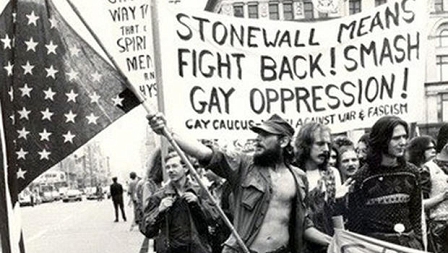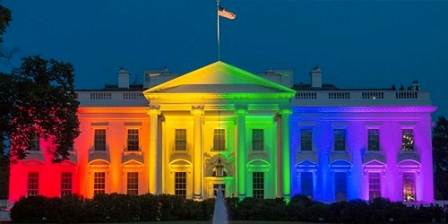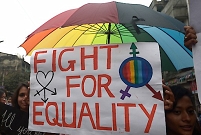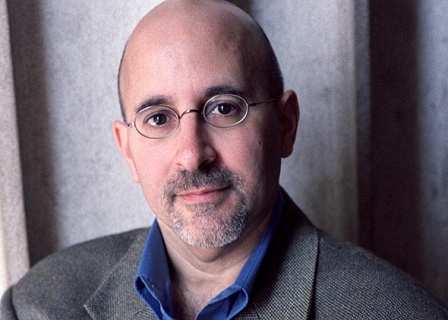Erstellt am: 27. 2. 2016 - 13:00 Uhr
Freedom to Marry
FM4 Reality Check
Hear the programme in the FM4 Player or subscribe to the podcast and get the whole programme after the show
For 32 years, Evan Wolfson campaigned tirelessly for gay rights, and more specifically for same sex marriage.
The movement he founded, Freedom to Marry, created the campaign that eventually won the right to same sex marriage in the United States, and Evan Wolfson is widely considered to have been the architect of the strategy that led to victory in 2015.
In this week's Reality Check Saturday Special, he sat down with me to talk about the campaign and his journey with it.
HR: Among all the gay rights issues, when did marriage become a separate and distinct focus?
EW: Gay people, at least in the United States, have always wanted the freedom to marry. We usually think of the modern gay rights movement as beginning with Stonewall in 1969 – that’s not exactly correct, but that’s what we usually use as the benchmark.

Stonewall
By 1972, there were at least three major cases working their way through the courts in the United States, one of them reached the Supreme Court, brought by couples seeking freedom to marry. The courts were not ready, the country was not ready, the conversation wasn’t ready, and so all of these cases lost. But marriage was always part of the movement right from the very beginning, and when, in the 1990s, another wave of couples brought another wave of cases, and this time, most importantly, in Hawaii, we found a court actually willing to give us a day in court, willing to take the claim seriously.
When we went on to win in Hawaii – the world’s first ever victory – it sent reverberations around the globe and launched this ongoing global movement, here in Austria as well as around the world, in favour of the freedom to marry, which has now resulted in 22 countries on 5 continents with the freedom to marry, including the United States and, of course, England.
HR: Was there something special about Hawaii? That was all back in 1993 – that we got the first victory there?
EW: Well, the most special thing was that we actually had the luck to have a court that was willing to give us a day in court. So, unlike the earlier cases, and unlike some of the later cases, the court took the constitution seriously, and said to the government, “If you want to discriminate, you have to at least show a reason.” And once we had that time in the courtroom, and the government had to come in with its arguments and its evidence and be tested, and we had a chance to put on our own witnesses and our own evidence in favour of the freedom to marry, it turned out the government didn’t have a reason. The whole thing was a house of cards.

Creative Commons
So we won in Hawaii because we had the chance to show the truth, and it wasn’t so much the magic of Hawaii, though there was a good cultural environment in Hawaii, Hawaii is a majority minority state, it is a state that has a tradition of tolerance and welcome, but there was also plenty of opposition, and once we won that first victory it launched this movement all around the world, and many other organizations in many other countries began taking leadership, and gay people began dreaming that we could really have this.
HR: There are people in the LGBT community who say that, "Marriage needs us, more than we need marriage". How do you respond to that?
EW: I think, actually, at the end of the day, gay people are as diverse as non-gay people, and we are going to be as good at marriage as non-gay people, and we are going to screw it up as much as non-gay people do. For many, many people marriage brings affirmation and support, it’s an opportunity to stand before your family and friends, and be accountable for the love you have and the commitment you aspire to, and it brings the law to the side of the family with all kinds of protections and responsibilities that many people benefit from, and some people find difficult. Marriage has been one of the most resilient institutions in all of human history. Virtually every society has had some form of marriage. The history of marriage is a history of turbulence and change, but marriage has also been something that again, and again, and again societies, and people, and the law have found very important, and that importance now is something for gay people to share in, and that’s the history of marriage.
HR: Is the fight now over? Now that same sex marriage is legal throughout the [USA] do we have full equality? Can we sit back and say, “Job done”.
EW: The Freedom to Marry campaign that I lead is done. After more than 40 years of fighting, and for me more than 32 years of campaigning, we have won. So this freedom to marry campaign is winding down, and I will close it next year. But while the work of the campaign is done, the work of our movement is far from over.

Creative Commons
There are many, many legal and political objectives in the United States and, of course, around the world that remain unfulfilled. For example, in the United States we don’t have a federal civil rights law prohibiting discrimination on the basis of sexual orientation and gender identity. In other important areas of life such as employment, housing, public accommodations such as restaurants, and theatres, and so on – so we need to keep working, and build on what we’ve achieved and take this momentum and keep going, to secure the non-discrimination protections that we need. And of course, we don’t just want good laws, we also want good lives, and so while the legal and political work are essential, and we have to build the same kind of campaigns that brought us the freedom to marry victory, we also need to do the cultural engagement, the community work, to make sure that young people are growing up safe, and secure, and free, and able to dream big, and not be fearful because they feel isolated because they’re gay or transgender. And similarly we have to make sure that older gay people, and older transgender people, as we age, don't get forced back into the closet because we can't find support or facilities to take care of us and help us as we get older.
HR: There is, in Austria, this movement called "Ehe Gleich", because it is not equal yet. Would you give any tips from your experience in the United States? Is there anything you would suggest to the people who are fighting for marriage equality here?
EW: I think what we have in Austria is a political track to getting the job done, and also a legal track, a track of litigation in the courts, and both tracks are good and both tracks should be pursued. One of the ways in which you help the politicians do what they should do and catch up to the people – the people in Austria support the freedom to marry by 73% - but we have to turn that public support into real pressure on the political parties to get the job done. We have to use that political support, and engage that political support to create the climate that also says to the courts, “You can do the right thing, and you need to do it. And there’s urgency, because every day that families in Austria are denied the freedom to marry, it’s not an abstract question, it means that people are deprived of important legal and political protections. Even more, it means that they are being insulted, families are being disrespected. Austria ought to be up there with France, and with Britain, and with Catholic Ireland, and Spain, and Holland, and Belgium and all the other European countries that are moving in the right direction. Austria should be leading, not lagging.
HR: What do you see now as the main threats to same sex marriage, to marriage equality?

AFP/DIBYANGSHU SARKAR
I think it’s highly unlikely that the gains we have made in counties like the United States now are going to be reversed. I think the bigger threat in our country [the USA) is complacency; thinking, as you asked earlier, “Are we done? Is it enough? Shall we sit back?” I think people need to be summoned to stay engaged because there’s a lot more to do in the United States. We’ve won the freedom to marry, which puts us ahead of some countries, like Austria, like Germany, like Switzerland, but in many other respects in the United States, we’re behind where other countries like Austria, and Germany, and Switzerland, and other counties are in other protections such as non- discrimination, and so on. So, there’s a lot more work to do in the United States, and, of course, there is a tremendous amount of work to do in so much of the rest of the world, including parts of Europe, Eastern Europe, and Russia, and others, that are in some sense going backwards.
The biggest threat is not within our countries, the biggest threat is that we need to keep going, because we’re not done until we’re achieved universal human rights, and safe and good lives, and good commerce, and the fulfilment of the kind of world we want to see. And if we don’t do the lifting in our own counties, like the United States and Austria, how are we going to get there?
HR: The first black president. Has that changed anything as far as civil rights and human rights are concerned in the USA?
EW: Well, I think it certainly is a barrier broken and it’s a wonderful affirmation of our goal of a society of full equality, and opportunity, and freedom, and respect for all, and yes, I think it was an enormous step forward, but it’s not a magic wand. It didn’t cure every problem, it didn’t solve everything. I’m sure that anyone who’d followed the news is seeing that in the United States right now we’re having a lot of debate, rightly so, over issues of police abuses, and alienation between the population and parts of the police, particularly as regards people of colour, and particularly African Americans. There are struggles in the United States, as in Europe, over immigrants and peoples’ attitudes; a minority that is anti-immigrant, a minority that is anti-Latino, but that makes a lot of noise, even though we’ve made a lot of progress. So the work is never done. Even though you’ve made gains, you still have to defend those gains, and build on those gains.
HR: Finally, as you’ve said, after 30 years in the right to marry movement, what does Evan Wolfson do now, with his time?
EW: Yes, well, right now I’m still working on winding down the campaign. It turns out that’s a lot of work, because we don’t want to just close overnight. We want to make sure we do a smart, strategic capturing of the lessons learned, archiving and documenting, and putting the resources and expertise that we have accumulated on the Web, and in the history books, and in the universities, and make them available to other movements, so that people can benefit from the stumbles and the successes that we’ve had, and that’s what I’m focused on right now. As far as my own personal next chapter goes, once we’ve closed Freedom to Marry, I don’t know yet. What I’m hoping is that, for at least a couple of years, I’ll be able to base myself somewhere in order to be able to take on some projects, and assist in some of the other causes and other battles without trying to take charge, and that will give me a chance to be helping, but also learning. And that will give me a little bit of time, and a chance to see, after being Mr Marriage for 32 years, what next is right for me.

Creative Commons
Dieses Element ist nicht mehr verfügbar
FM4 Reality Check
Monday to Friday from 12.00 to 14.00, Saturday from 12.00 to 13.00, and after the show via Podcast or fm4.orf.at/realitycheck.



